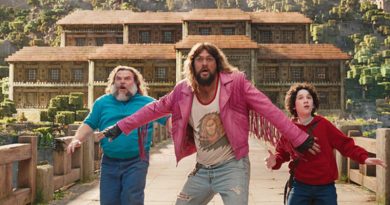The Furious Review: Kenji Tanigaki Goes For the Jugular in the Visceral Action-Packed Martial Arts Mayhem
It’s about time that Xie Miao is given a long-overdue breakthrough action role, and thanks to Kenji Tanigaki, he finally earned it in The Furious. This is especially true after the Beijing-born martial artist, who used to be a recognisable child star fighting alongside Jet Li in The New Legend of Shaolin and My Father Is a Hero back in the mid-1990s, before he took a break to focus on his education. He did make a comeback to acting post-graduation and, despite working steadily during his adult years, appearing in movies like The Taking of Tiger Mountain and The Thousand Faces of Dunjia, he couldn’t seem to reach the same creative heights that he enjoyed in his childhood era.
Now, in his early 40 years of age, he still has at least decades’ worth of filling in the shoes of the older-generation Asian martial arts film legends dominated by the likes of Jackie Chan and Donnie Yen. In his latest action movie, which takes place “somewhere in Southeast Asia” (it was actually filmed in Thailand), Xie Miao plays Wang Wei, a deaf-mute father who makes his living working as a handyman and lives with his precious daughter, Rainy (Yang Enyou). The movie wastes little time getting to the point: His daughter ends up getting kidnapped, prompting Wang Wei to rescue her at all costs.
This leads to an earlier fight scene against the kidnappers, showcasing Xie Miao’s impressively nimble martial arts moves that combine Tanigaki’s dynamic camerawork and Kensuke Sonomura’s intricate action direction. The story is as straightforward as it gets, even with Trivisa‘s Frank Hui and Mak Tin-Shu and Limbo‘s Shum Kwan-Sin — are enlisted as part of the screenwriting team alongside A Cool Fish‘s Lei Zhilong. The movie’s underlying plot about a child trafficking ring is nothing new, with past films from Merantau to The Man from Nowhere and Fierce Cop being some of the examples here.
But one thing I like about The Furious is that Tanigaki is neither pretentious nor heavy-handed with the subject matter, opting to strip it down to its bare essentials. He’s fully committed to the martial arts/action genre through and through, giving the fans and audiences alike are looking for — the kind of maximalist cinema that prioritises sensory-heavy spectacle over layered storytelling.
And for that, he succeeds admirably. The pace is brisk, and the movie’s nearly two-hour runtime is packed with one relentless action set-piece after another. As the movie progresses, Wang Wei’s desperate quest to locate his kidnapped daughter soon leads him to work together with Navin (Joe Taslim), who’s been searching for his missing journalist-wife, Matia (Jeeja Yanin).
The subsequent fight scenes are all crisply edited, allowing us to immerse ourselves in the elaborate choreography with thankfully none of the annoyingly jittery camera movements. Action fans are in for a treat in The Furious — a no-holds-barred, bone-crushing mayhem of brutal hand-to-hand combat, and at one point, Wang Wei takes down his assailants using a hammer. A three-way fight scene between Wang Wei and Navin against the sledgehammer-wielding Ho, played by Brian Le in the ice factory — if you can look past the dodgy CGI ice blocks — is worth mentioning here.
Then comes the second half, not only does Tanigaki escalate the stakes, but also switches from the old-school Hong Kong martial arts acrobatics to the gritty Japanese and Indonesian action movie-like style and tone that grows progressively violent. He also doesn’t shy away from spurting blood, gore and graphic violence, and he even saves the best for the last, culminating in an extended third act with the formidable Joey Iwanaga of Enter the Fat Dragon, and Yayan Ruhian in a tracksuit show up with a bow and an arrow.
The scene also features the much-talked-about five-way fight sequence, easily one of the most thrilling and insanely choreographed action set pieces ever seen in recent memory. It’s an all-out, crescendo-like rampage as the cameras did an incredible job tracking and emphasising each of the fighters’ unique moves without missing a beat. The acting is adequate enough for what it is, with credits especially going to Xie Miao and Joe Taslim’s no-nonsense performances, while the former shares a resonant father-daughter dynamic with Yang Enyou’s Rainy.





